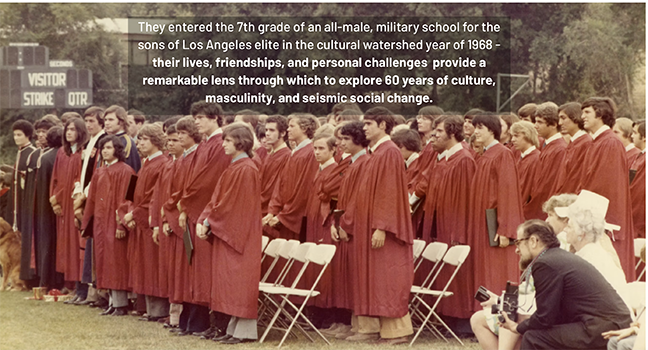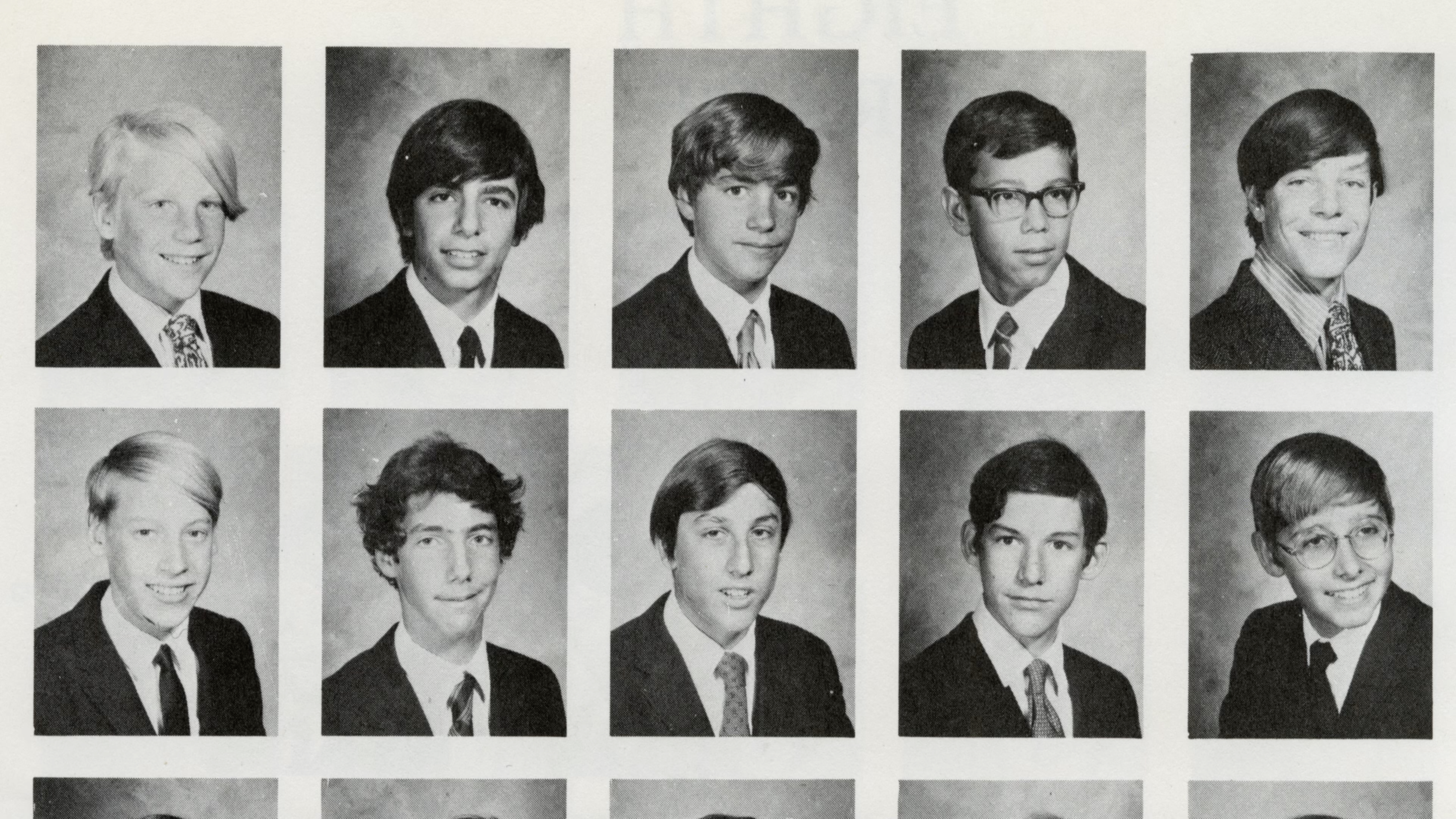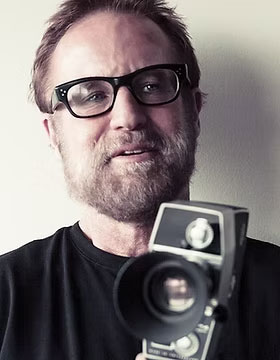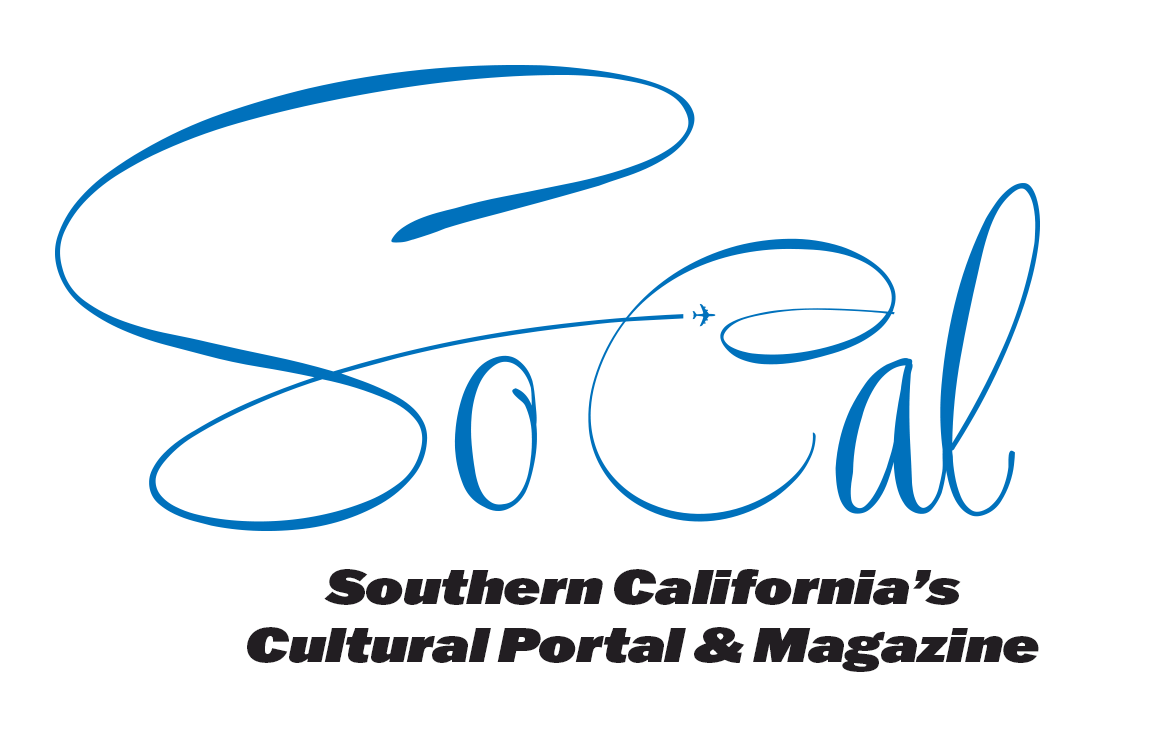


A few years ago, I had the opportunity to meet up with my fellow classmates from High School in a Santa Monica restaurant. It was a reunion of sorts; we hadn’t seen each in decades. We were nine people, with nine stories about life, death, drugs, sex, early crushes, and lost dreams. Watching Fortunate Sons reminded me that the people from those high school years hold a special place in time and memory.
This documentary looks at a group of men—primarily privileged white men who entered high school in 1968. Decades later, during the COVID crisis, they reconnected through Zoom meetings and rediscovered the power of enduring friendship.
As I watched Fortunate Sons, with some hesitation—how could a documentary about a group of rich white kids in a private school be of interest? In a short time, the answer was clear: the stories we each carry are told here—articulate, funny, poignant, and emotional.
The final credits in particular were startling and sad. But this is, after all, a documentary about life.
We sat down with director and participant Peter Jones recently to discuss the documentary.
Meet the Director
Peter Jones is a documentary filmmaker and producer known for creating socially and culturally impactful films. His work often explores personal and historical narratives, blending intimate storytelling with broader societal themes.
His works has included Inventing LA: The Chandlers and Their Times (2009) – A Peabody Award-winning film that examines the influence of the Chandler family on Los Angeles’s media landscape.
Johnny Carson: King of Late Night (2012) – A documentary about the life and career of the iconic television host, It aired on PBS as part of the American Masters series.
All Man: The International Male Story (2022), a documentary that delves into the history and impact of the International Male catalog (reviewed in SoCalmag.com)
His latest project, Fortunate Sons, reflects his ongoing interest in personal stories within larger social contexts. The documentary will air on PBS SoCal on September 3.
Revisiting the Past
Q: The subject of Fortunate Sons is a look at a group of men from the graduating class of Harvard 1974, and forty years later during COVID, creating the basis for what will be their 50th anniversary. It should be noted that the school in question is the Harvard School for Boys in Los Angeles.
Jones explains that the film traces the lives of classmates over decades, capturing how relationships evolve over time.
Q: How did this documentary come about?
My classmates started holding Zoom meetings, and I attended one. Someone asked, ‘Would you be interested in doing a story about these meetings?’ Our 50th reunion was coming up in four years, so I thought maybe we could build toward that. I joked, ‘Who would give a shit about a bunch of privileged white men? Is there a more hated demographic in America today?’ I apologized on the call because I realized I had to confront my own biases about who would care about growing up rich.”
Once I started the interviews, I was amazed at how candid everyone was. I owe it all to COVID and Zoom—we were stuck at home, but I could connect with classmates anytime.
The Path to Documentary Filmmaking
Q: What pointed you in the direction of making documentaries?
Jones began his career in journalism, reporting news and weather in Roanoke, Virginia, before moving to Austin, Texas, where he covered feature stories and live events.
Moving to LA, I asked myself, ‘What can I do here that nobody else is doing?’ I decided to focus on Hollywood history stories, but tell them truthfully. I started posting short featurettes for the Movie Channel, then worked on AMC in Hollywood, producing longer stories about old Hollywood. That led to my first documentary, Bally: The Art of Cinema Showmanship, hosted by Frankie Avalon. It explored the lengths people would go to attract audiences to movie theaters. I had a blast working on it.
Fortunate Sons
Q: What is the background on this documentary?
Jones emphasizes the bond formed during their shared high school years.
We all went through COVID, were born the same year, and had this six-year period together. Fast forward 45 years, and we naturally fell back into old rhythms—but now with more maturity and better listening skills,” he explains.
The most striking part was how forthcoming everyone was. They trusted me, knowing I wouldn’t betray their confidence. That trust allowed for honest conversations where classmates shared some of the darkest moments of their lives in a way that felt heroic.
Martin Montague’s Story
Q: One person in your documentary, Martin Montague (his father is Nathaniel “Magnificent” Montague, a famous DJ in Los Angeles in the 60s), was the only Black student at Harvard School for Boys. He did not attend the 50th reunion—did you get a reason?
I have a whole file on Martin. As the only Black classmate, I wanted to tell his story. It took time to earn his trust because his experience at the school was difficult. While he didn’t particularly like the school, he valued the education he received. Over time, we became good friends.
Jones describes Martin as a remarkable person: He survived a challenging childhood, taught himself to fly, and is a skilled electrician. He lives on a farm in Arizona with his partner Olga, raising chickens and even building a plane in their barn. Everything portrayed in the documentary is accurate.
Festival Life and Reception
Q: What happens with documentary films? Do the films go on to festivals?
Festivals talk to each other, and word spread that the film was international, engaging, and unique. While the topic of privileged white men at an all-boys school might seem niche, audiences fell in love with it. PBS SoCal understood its appeal, and I expect word-of-mouth to expand its reach.
It highlights the importance of honest conversation. Young boys today often struggle with depression and anxiety because they don’t talk openly. This film shows men genuinely talking and listening to each other. We’ve been picked up by a distributor for educational screenings in schools, colleges, and nonprofit settings.
Making Documentaries in Today’s Culture
Q: What is it like in the current culture making documentaries?
It’s a different world now,” Jones admits. “There are countless outlets, and it’s harder for anything to stand out. Budgets are smaller than they used to be. I’m taking a break, and I recently found out I was accepted to graduate school at Antioch University to become a licensed psychotherapist. I want to apply the skills I learned as a reporter—and growing up in my family—to help people, especially during these challenging times.
When can we see the documentary?
Q: When does it air?
It airs Wednesday on PBS SoCal at 8 p.m., and again the next day on Thursday at 11 p.m. After that, it will be distributed nationally. I’m grateful to all the PBS affiliates around the country.
To watch the trailer: https://www.fortunate-sons.com/
